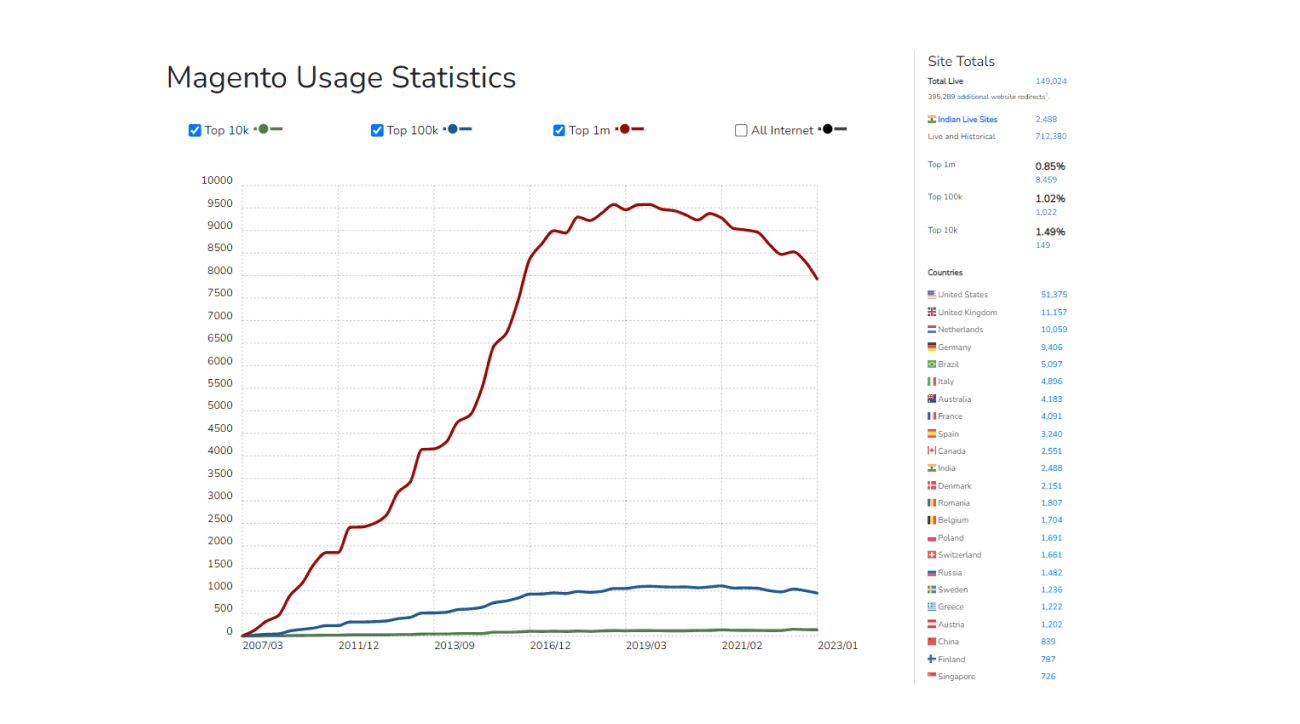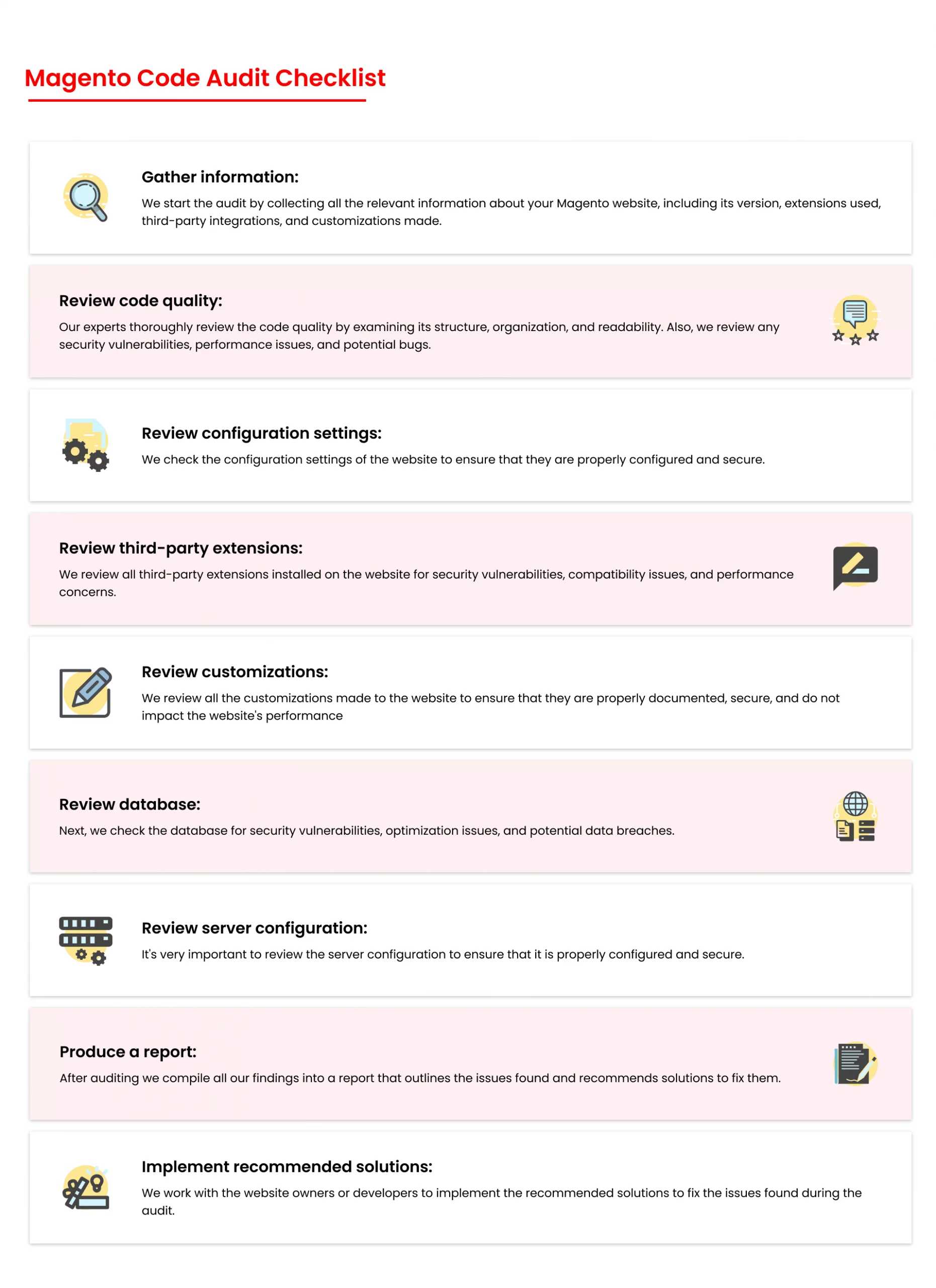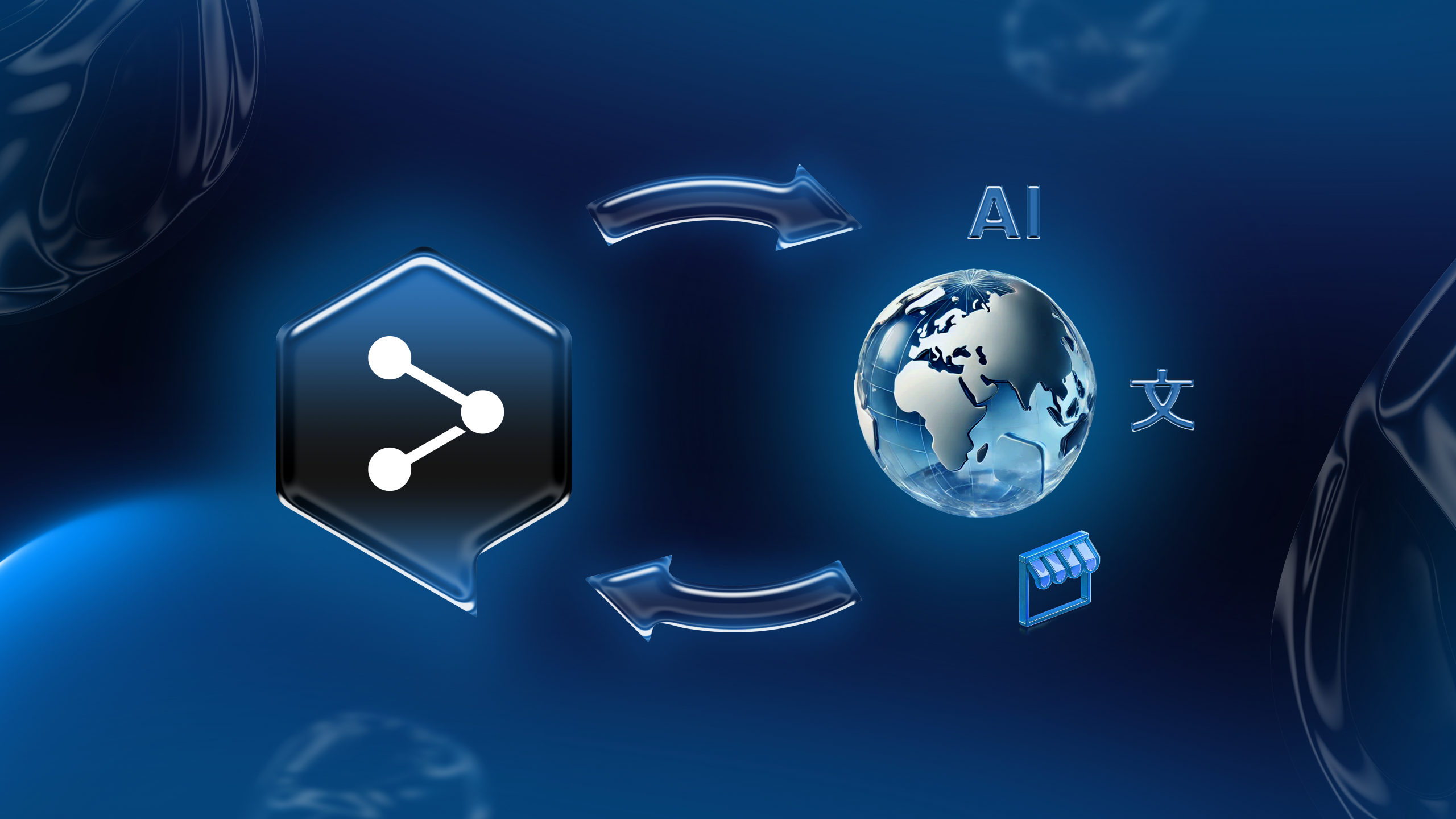When was your last Magento code audit?
If your Magento E-commerce website is struggling with issues like bugs, frequent crashes, and slow load times, or if you are worried about the potential problems before launching your new Magento store.
Don’t despair – a comprehensive examination of your website’s codebase may hold the solution.
Curious about the specifics of a Magento code audit and how it can enhance your website’s performance? Look no further! This article provides a detailed overview of the audit process, including the areas it covers to ensure that your website operates at its optimal level.
In this blog post, we will cover
- What is a Magento Code Audit?
- Why is it necessary for your website?
- What are things you need to check while conducting a Magento Code Audit?
- Our Magento Code Auditing Process
What is a Magento Code Audit?
A Magento code audit is a technical audit done to analyze the health and quality of your website’s codebase. It reviews the entire core files, third-party extensions, and database to find possible issues that are affecting your website’s performance.

Such a comprehensive audit is done by experienced and certified Magento experts to provide a detailed report on your website’s code quality, critical security vulnerabilities, functional issues, and performance barriers.
In the long run, this audit is going to optimize your website performance by taking actionable measures against anything that’s affecting your website’s codebase.
Need a comprehensive review of your e-commerce website? Our experts can help you! Get in Touch.
Why is a Magento Code Audit necessary?
Recently, Magento (Adobe Commerce) has grown to be one of the most popular and sought-after e-commerce platforms due to its distinctive features and user-friendly interface. It holds a global market share of 2.56% and is currently in use by 149,024 live websites.

The platform runs on codes written using PHP. Each functionality that you see in the front-end is supported by relevant codes at the back-end to keep the website running. Also, it is loaded with numerous extensions that can be customized to suit your store’s unique needs—further, adding to its complexity. However, installing too many can be a recipe for disaster.
Sometimes, bugs can slip through the cracks, causing frustrating glitches that disrupt the user experience. You might not even be aware of these issues until it’s too late, and your website has already suffered some serious damage.
It’s like driving a car with a flat tire and not realizing why it’s not running smoothly.
So, in a nutshell, we can say that your website’s functionality relies on its code and installed extensions, which act as building blocks for your e-commerce store. If they don’t function properly everything will fall out of place. Your entire website can suffer, becoming disorganized and chaotic.
Hence, this is where a Magento code audit becomes necessary. It identifies and addresses areas in your codebase that need attention, thereby preventing any significant damage.
If you observe any of the following indications, it is recommended that you promptly hire a professional Magento service provider :
● Poor website speed causing sales drop
● Unresponsive tabs or broken links
● Interface errors
● Frequent website crash
● Displaying error messages
● Unauthorized warning messages
● Running on an outdated Magento version
What’s usually checked during a Magento Code Audit
Security Vulnerabilities
Security is one of the most critical aspects to check during a Magento Code Audit. Hackers are always in search of security vulnerabilities in your store to gain unauthorized access and steal sensitive customer data. Some of the major security vulnerabilities covered under code audit are:
● SQL injection attacks
● Cross-Site Scripting Attacks (XSS)
● Server Misconfiguration/ Server Security
● Remote Code Execution (RCE)
● Code Vulnerabilities
● Password Policies
● Third-Party Extensions
● Secure Communication
To overcome all these security concerns, always keep your Magento website up-to-date. Review and install security patches as and when released to prevent known vulnerabilities from being exploited by attackers. Implement HTTPS throughout your website with updated SSL certificates to secure communication between the browser and the server. Use SSH password-based authentication. Regularly perform code audits to identify vulnerabilities arising from code customization. Also, ensure that all the third-party extensions are vetted before installation.
Performance Optimization
Optimizing website performance is most critical in improving conversions. Because a website that loads slowly leads to poor user experience resulting in lost sales. The code audit performs an analysis of the codebase to check for areas that can be optimized for performance by
● Reducing page load time
● Implementing configured caching
● Reducing unnecessary database calls
● Avoiding typical code customization
● Using minified CSS/JS versions
● Checking for cross-browser compatibility
● Image optimization
● Database optimization
● Removing irrelevant third-party extensions
New Relic, a SaaS-based platform performance monitoring tool, is now one of the most popular tools among Magento developers as it helps in making data-driven decisions based on real-time observability.
Take a look at this video “Demystifying Magento performance”, where our CEO shares some crucial tips and tricks to enhance your store’s performance.
Magento Core Integrity Review
Your store has a Magento core with inbuilt modules which should be kept unmodified.
In the code audit, developers check for any changes in the Magento core to ensure that it is tamperproof to help with future website upgrades. However, in certain circumstances, novice programmers can mess with the core by directly overwriting additional functionalities to it. You must be aware that the Magento core once modified loses its integrity and may sometimes become irreparable causing severe security and performance issues.
So, any additional functionalities you wish to implement should be added as Magento extensions or third-party extensions.
Code Quality Review
Another important area to cover under code audit is code quality. It checks your Magento module code, theme code, and third-party codes.
If your store is running on poorly written codes, it is more likely to encounter downtime due to bugs, security vulnerabilities, and performance issues.
Our developers are here to figure out your code quality and ensure that your website has the highest quality code in place by checking the following:
● Best coding practices as per Magento coding standards.
● Consistent naming conventions
● Modularized codes
● Compatibility with custom codes and third-party extensions
● Using reliable third-party applications and extensions
To identify further inconsistencies in your code PHP Code Sniffer can be used. Your auditor may also consider refactoring CSS if any inconsistencies and redundancies are observed while reviewing your theme code.
Database Integration
Auditing your database is also equally important to improve its speed, efficiency, and security. It allows in identifying any possible vulnerabilities that may set holes in your site for attackers.
So, our developers during the audit ensures to
● Upgrade your site to the latest version of Magento
● Normalize the database to enhance flexibility and security.
● Control redundancy
● Follow proper indexing.
● Check security features and identify potential breaches on the updated versions
Magento offers a Site-Wide Analysis Tool (SWAT) to perform a thorough checkup of the store’s health. It conducts a performance analysis of your site and identifies issues to come up with the best possible solutions as per industry standards.
Our Magento Code Auditing Checklist
Our code auditing process involves a comprehensive and systematic review of each line of code in your codebase. The goal is to identify all the potential issues, vulnerabilities or areas of improvement to ensure a secure and high-performing website.
Generally, the Magento code audit needs to be conducted once or twice a year. However, the more frequently you conduct the audit the more scalable and secure your website becomes. The time taken to complete it varies depending on the platform’s size, integrated functionalities, implemented features, and the frequency of website updates.
Here are the key steps involved in our Magento Code Auditing process

Conclusion
As you aim to scale your business, it’s important that you review your site’s capabilities to withstand updates and security threats. Performing periodic code audits helps in analyzing all the underlying issues that need to be rectified. We recommend hiring the best developers in the industry to audit your codes and database to ensure your site is under optimal conditions. Codilar Technologies with a proven history of successfully revolutionizing the e-commerce industry can assist and support your online store using the best available solutions.










